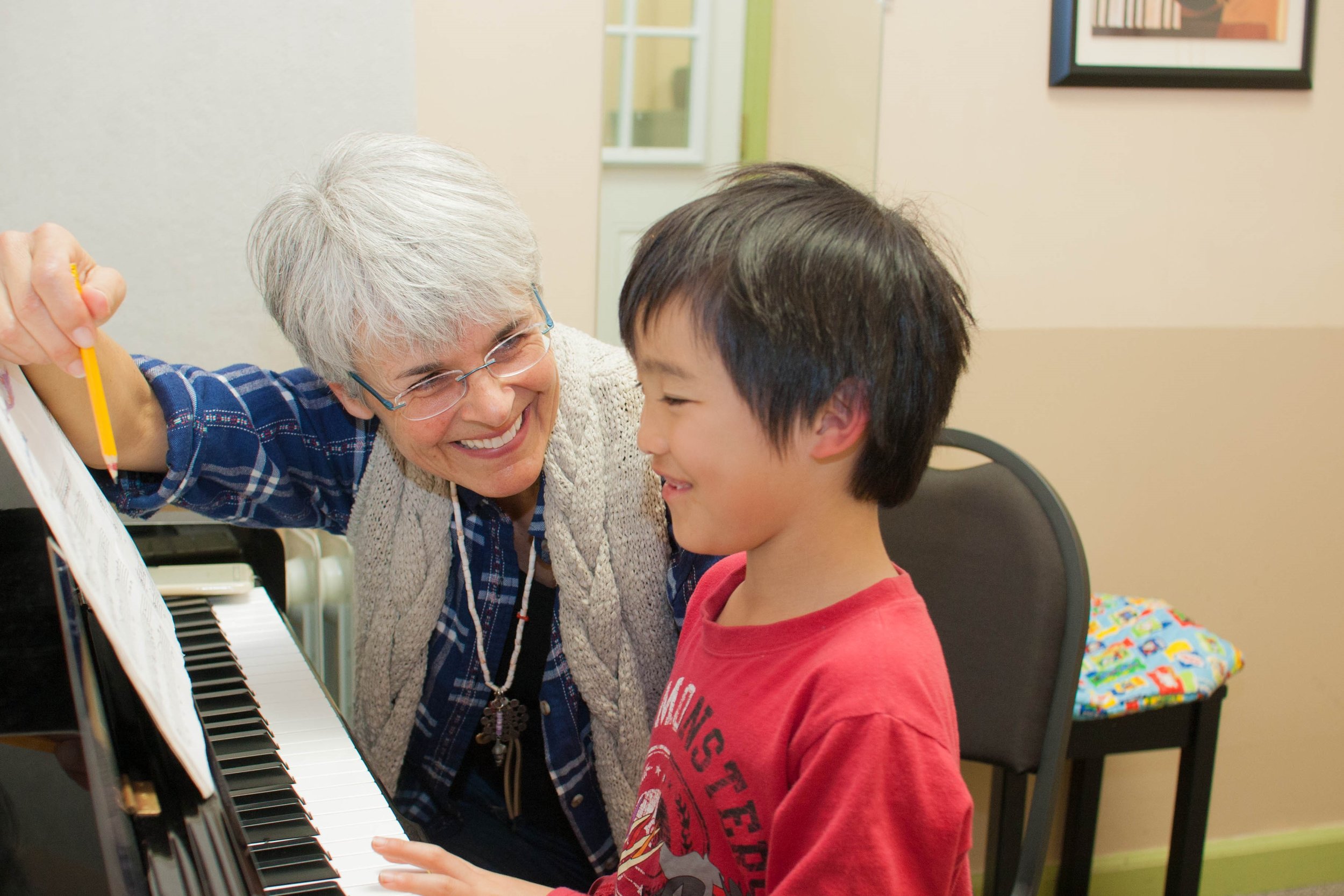Which instruments do you specialize in teaching? For how long have you been teaching?
I’ve been teaching piano and keyboard for 40 years as a one-on-one and group instructor.
What first got you into music?
When I was a child, friends had a home-organ and when I heard their daughter play, it immediately gave me such a kick that I begged my parents to buy one. Which they did. And a few years later I feel in love with the music of Bach and wanted to play at the church in our home town, but I was lacking the strength in my fingers, since the organ in church had a harder touch, so they wanted me to play piano first. So my parents got me a piano and I fell in love immediately. Still in high school I had started to teach keyboard and piano. And I wanted to start a band with two of my girl-friends, who backed out after our long practices and so I started to play in a duo with my dad, who’s band had just fallen apart for health reasons of his two band members. Since I still lived at home it was easy to find practice time with my dad and when we had 100 songs up and going, we decided that I was ready to join the podium at weddings, parties, beer-gardens etc. We played together for 7 years until I moved away. We had both been singing, I played the keyboard, he played guitar and saxophone. In the U.S. I got interested in Orff Music and joined many workshops around San Francisco and signed up for college classes in Orff Music and Jazz Piano. I was a music teacher for some years in my daughter’s Elementary School in the Cupertino School District and enjoyed working again with groups of students. When Legato Music School opened, Ms. Haruna, who knew me for my German mother tongue, when I was of assistance for her German voice lessons, asked me to join and ever since I am teaching at her studio.
What about your work in music education inspires you to keep teaching?
Music is like oxygen, from early childhood on humans should be filled up with a healthy amount of music around them, singing and playing instruments from babyhood on. Using hand clapping, feet stomping to the sound of triangles, bells and sticks, then adding drums, tambourines and xylophones, and moving on to piano and all the other instruments that the kids might enjoy. And always keep dancing and singing to stimulate the brain, the mood and the well-being.
What projects are you currently working on or worked on recently?
My teaching always includes songs, the background of songs, the history within, the composers lives, and lots of theory in a fresh and exiting way, so the students can remember lots of things that surround a song and train their brain. If a student understands more about a song, it’s more interesting to play and to move on to a greater repertoire.
“There are no age-restriction when it comes to music. Young children should hop and dance with creating sound and music so they see music as an outlet for emotions and as something as natural and life-embracing. ”
When should students start playing musical instruments?
A human body needs to start enjoying music already when still in the mother’s womb. Music should be played and sung to the newborn baby quietly to calm the baby and the baby needs to feel the movement and rhythm when carried around by the family. When a baby is about 1 year old they can hold a shaker and make sounds while the family is singing and laughing and joining in with other Orff instruments. Just very basic starts into music. The older the child gets the more sophisticated the items can get to create sounds. Rhymes can be made more interesting by adding hand-clapping, stomping, leg-clapping. There are no age-restriction when it comes to music. Young children should hop and dance with creating sound and music so they see music as an outlet for emotions and as something as natural and life-embracing.
How do you use music to develop a sense of community—to bring students, parents, families and teachers together?
I love to participate in the Legato Music School recitals and make it an important point for ALL students to participate. I also enjoy to see that my students enjoy to reach out to the community, that’s why I want them to learn some songs for people in elderly homes and assisted living. All my students understand the importance of giving some of their talent and time to create beautiful memories for people in these facilities and bring joy and happiness with their music to the senior homes.
Who's one musician/artist, from any time period, that you think readers should listen to?
Students need to be exposed to all kinds of different music, starting with children’s songs, to “light” classical music like Mozart. Kids should be taken to street concerts, to bands who play at festivals, to Opera and Concert Houses to see professionals play and to learn to focus on music at a new level. But for every person music means something different and the older the students get the more a teacher needs to let them co-decide on which route they are moving forward. What style, what composers are “speaking” to them and give their body a “kick”, so music will stay in their life forever.
Thank you so much, Ms. Diana, for the thought-provoking and compassionate words!

